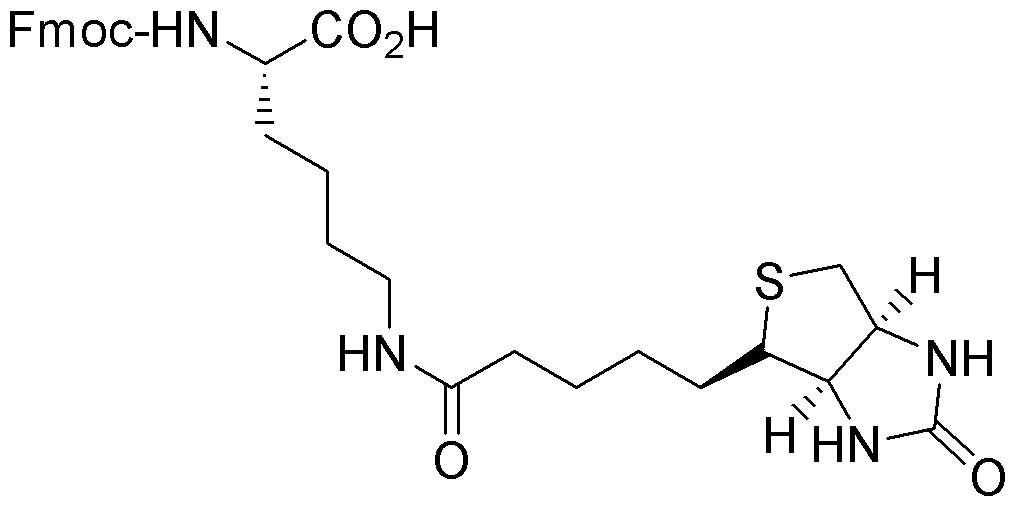Na-Fmoc-Ne-biotinyl-D-lysine is widely utilized in research focused on:
- Bioconjugation: This compound is essential for attaching biotin to proteins or peptides, facilitating the study of protein interactions and functions in various biological systems.
- Drug Development: In pharmaceutical research, it aids in the design of targeted drug delivery systems, enhancing the specificity and efficacy of therapeutic agents.
- Diagnostics: It plays a crucial role in the development of diagnostic assays, particularly in the detection of biomarkers through biotin-streptavidin interactions, which are highly sensitive and specific.
- Protein Purification: Researchers use this compound to create affinity tags that simplify the purification process of recombinant proteins, making it easier to obtain high-purity samples for further study.
- Gene Expression Studies: It is utilized in the development of biotinylated oligonucleotides for studying gene expression, allowing for more accurate tracking and analysis of RNA molecules in cellular contexts.
General Information
Properties
Safety and Regulations
Applications
Na-Fmoc-Ne-biotinyl-D-lysine is widely utilized in research focused on:
- Bioconjugation: This compound is essential for attaching biotin to proteins or peptides, facilitating the study of protein interactions and functions in various biological systems.
- Drug Development: In pharmaceutical research, it aids in the design of targeted drug delivery systems, enhancing the specificity and efficacy of therapeutic agents.
- Diagnostics: It plays a crucial role in the development of diagnostic assays, particularly in the detection of biomarkers through biotin-streptavidin interactions, which are highly sensitive and specific.
- Protein Purification: Researchers use this compound to create affinity tags that simplify the purification process of recombinant proteins, making it easier to obtain high-purity samples for further study.
- Gene Expression Studies: It is utilized in the development of biotinylated oligonucleotides for studying gene expression, allowing for more accurate tracking and analysis of RNA molecules in cellular contexts.
Documents
Safety Data Sheets (SDS)
The SDS provides comprehensive safety information on handling, storage, and disposal of the product.
Product Specification (PS)
The PS provides a comprehensive breakdown of the product’s properties, including chemical composition, physical state, purity, and storage requirements. It also details acceptable quality ranges and the product's intended applications.
Certificates of Analysis (COA)
Search for Certificates of Analysis (COA) by entering the products Lot Number. Lot and Batch Numbers can be found on a product’s label following the words ‘Lot’ or ‘Batch’.
Número de catálogo
Número de lote/lote
Certificates Of Origin (COO)
This COO confirms the country where the product was manufactured, and also details the materials and components used in it and whether it is derived from natural, synthetic, or other specific sources. This certificate may be required for customs, trade, and regulatory compliance.
Número de catálogo
Número de lote/lote
Safety Data Sheets (SDS)
The SDS provides comprehensive safety information on handling, storage, and disposal of the product.
DownloadProduct Specification (PS)
The PS provides a comprehensive breakdown of the product’s properties, including chemical composition, physical state, purity, and storage requirements. It also details acceptable quality ranges and the product's intended applications.
DownloadCertificates of Analysis (COA)
Search for Certificates of Analysis (COA) by entering the products Lot Number. Lot and Batch Numbers can be found on a product’s label following the words ‘Lot’ or ‘Batch’.
Número de catálogo
Número de lote/lote
Certificates Of Origin (COO)
This COO confirms the country where the product was manufactured, and also details the materials and components used in it and whether it is derived from natural, synthetic, or other specific sources. This certificate may be required for customs, trade, and regulatory compliance.


